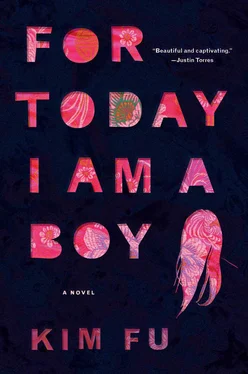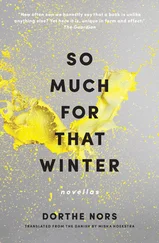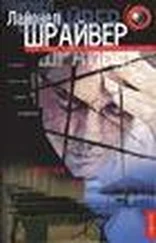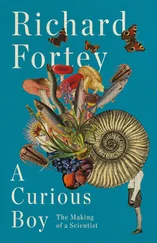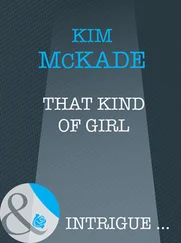We fell asleep. When I woke, it was dark; she had turned onto her side and I had spooned against her back in my sleep. The thing was hard between us. I tried not to move, tried to pack down my disgust into something smaller and denser, into something small enough to swallow, something I could make disappear.
Dating Claire was like learning to meditate. Discipline consumed my life. All the clamor inside was silenced, replaced with static, white noise.
Claire’s pastor told her she was neglecting her ministry, so we went to the Village on east Sainte-Catherine to hand out flyers for Pathway. Rainbow flags hung from every other balcony, rainbow stickers in the shop windows. Claire said one of the principles of Pathway was “reject temptation and accept the Lord.” She said, “You need to approach the devil to defeat him.”
We stood on the sidewalk between two bar patios. Claire thrust flyers into the hands of two girls walking together. “Do you want to know the path to happiness?” she asked. “The path to love?”
“I know the path to love, honey,” the girl said, still heading for the bar. “It’s right through those doors.” She and her friend laughed.
I didn’t say anything as I handed out the flyers. Most people took them. I watched some get thrown away at the first trash can. One man, younger than me, read it through and tucked it into his back pocket. Someone threw a beer at us. We jumped back and the plastic cup just splashed our feet.
A woman approached us. My first thought was that she was unusually tall. She wore a striped blue sundress and opaque tan nylons with white pumps. Her crooked, once-broken nose called up a strange memory: little boys beating each other on the playground.
She faced us directly, her hands on her hips. “I think you two better get out of here,” she said.
“This is a public sidewalk,” Claire said.
“Yes, but you’re harassing my customers.” Her voice was throaty, awkward. False. “You can go on handing out your hateful little flyers across the street.”
“God loves you,” Claire said. “Even when you do what is unnatural. Even when you disobey Him. He’s always waiting for you.”
“I can call you in for loitering.” Thick-limbed, thick-shouldered. Square jaw smothered in orange-toned foundation, fake eyelashes in the daytime. Still somehow convincing. I felt a sinking sensation, like the sidewalk had gone soft under my feet. The white static in my brain crackled back into images. It’s easy to have a phobia of water if you always stay inland, avoid the shimmering, inviting, treacherous depths.
Claire tugged me by the sleeve to the corner of the intersection. Passing cars roared in my ears. She stroked my hand sympathetically as we waited for the light to change. “The devil conjured that demon just for you,” she said.
I’d left Mother alone after Father died. When I thought of her, I imagined all but one of the chairs against the wall, Mother sitting alone at the kitchen table and mourning — her dead husband, and her children who had run to every corner of the earth.
Mother answered the phone in Cantonese. “ Wai? ”
“Mother?”
“Peter? What do you want? I’m busy.”
I wanted her to meet Claire. I wanted to marry Claire, wanted the train of her wedding dress to trail behind us like a white flag of surrender, erasing faggots and whores. I’d thought Mother would be overjoyed to hear from me. Her voice was brisk and unfamiliar.
After a moment of dead air, Mother made an impatient noise. “Are you still there?”
“Yes.” I hesitated. “How have you been?”
“Fine, fine. Are you coming home?”
“I can come visit.”
“Good!” I could hear the TV in the background on Mother’s end: someone cried out in high-pitched, whiny Cantonese, “Aiyee!” Canned laughter. “Can you bring a big car?”
I rented a van and drove it to Fort Michel on my next day off. The outside of the house was in need of repairs — the gutter had come loose, the paint on the sidings was chipped — but the inside was spotless and bare. She’d had the carpets ripped out and replaced by laminate, fake wood that broadcasted its fakeness: even, glossy, no knots. The new table in the kitchen sat only two.
Mother and I packed up all of my sisters’ and my belongings; our father’s things were already gone, down to the last sock. She threw open the windows, letting out the stirred dust and the smell of molding clothes.
Mother was like a different person. Silent except in rage all our lives, she’d blossomed at the mouth. She couldn’t stop talking. Anecdotes about our childhoods burst out of her, grown strange or impossible from too much time in the dark of her closed throat: Adele taught herself to read. I brought a family of rats home in my backpack. Helen bit a wasp right out of the air and chewed it before it could sting.
“When we brought Helen home from the hospital,” she said as we dragged garbage bags full of clothes and toys and books to the door, “she slept through the first night without crying. And the next, and the next, and almost every one after that. Geng sei-a, I kept checking to make sure she hadn’t stopped breathing.
“At her vaccinations, she didn’t cry when we handed her to the doctor. She watched the needle going into her fat little arm, then she turned to the wall. No tears. We thought maybe she was… what’s the word? Broken-headed. Broken in the head.”
I opened up the chest of drawers in the room that had belonged to Adele and Helen, then Helen and Bonnie, then just Bonnie. No one had touched it since Bonnie had moved out. “This too?”
“Everything,” Mother said. She continued her story. “And Helen didn’t talk. She didn’t talk until she was three years old, when she said a complete sentence. ‘Can I have a cookie?’ Can you believe that, Peter? ‘Can I have a cookie.’ No jibber-jabber, no mama, dada, like the rest of you. I guess she just didn’t feel like talking. Ha!”
I had to stop and stare. The Ha! threw me so completely, my mother laughing at her own joke. My mother laughing.
There were pictures of people I didn’t know all over the house. Most of the photos were old — black-and-white, or the red sun and washed-out grays of the ’60s and ’70s — but one stood out as recent. My mother, as she looked now, stood with a young woman at a crowded picnic in the park. I picked it up as a way of changing the subject. “Who is this?”
“Oh, I met her at the Chinese Association.” Mother’s gaze held steady. “She’s like the daughter I never had.”
I put down the picture, turning my back. Mother’s hair was thinning in a way that left visible strips of scalp, and her nails and skin were becoming that same fragile, rosy ivory.
Mother wrote down the address of the Salvation Army store in Barrie, Ontario. They were expecting me. I loaded all the bags and boxes into the van.
While I didn’t believe in the devil literally, as Claire did, I did feel as though this temptation was somehow the result of a greater force. That the universe had conspired to send me down the bumpy local roads with a van full of women’s clothes, shoes, and accessories. The teenage wardrobes of the women I had most idolized.
This was my chance, I thought, to prove my strength. I pictured each step in turn: Giving a firm handshake to the volunteers at the Barrie Salvation Army, helping them unload. One of the bags rips and a particularly coveted item peeks through the corner. Adele’s prom dress, say, with its short flare and underlayers of tulle. And I just ignore it. I pictured the drive back to Montreal. The empty van like an empty mind, a clear and guiltless heart. I couldn’t wait to tell Claire that I’d fought the devil and won. I could see her excited face. I could see us taking our clothes off and going to bed together.
Читать дальше
